#studyblr questions
Explore tagged Tumblr posts
Text
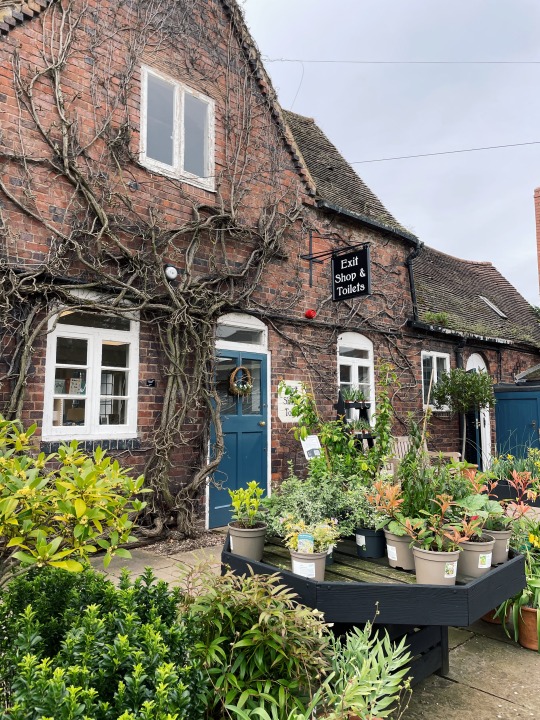
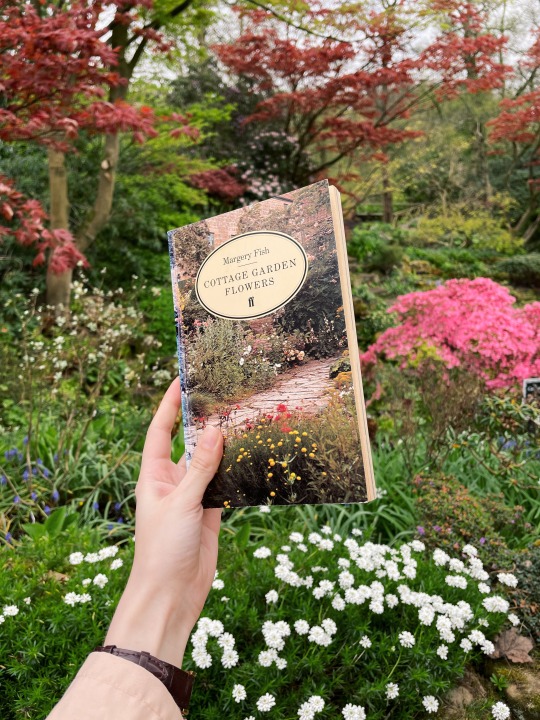
The highlight of my week was taking a break from the city to visit Winterbourne House & Garden. I enjoyed a scone, picked up this book, marvelled at some pretty flowers and worked on my stats assignment 🌷🌼💖🌻🌸✨
#There was a lovely artist there who entertained all my questions on botanical art 🥺 British people are so kind 💓#Last day in Birmingham before we head off to London 💛✨#studyblr#cottagecore#gardencore#garden aesthetic#light academia#cottage aesthetic#cottagecore aesthetic#cottage lifestyle#fairycore#flowercore#flowers
2K notes
·
View notes
Text
how I take notes on non fiction books
I recently made a post on my study method, and decided to make a whole separate post on my note taking method. The structure of the notes I write doesn't vary too much from my lecture notes to things I might have to read. A couple of useful informations you might want to know before I start actually talking about note writing is that I am mainly focused on studying history (tho I have had other humanities exams in my degrees), and that I study for oral exams in which the material is mainly composed of non fiction books, but sometimes include articles as well as lecture notes. Somehow I have also failed to mention that I am speaking about HANDWRITTEN NOTES. I only do handwritten notes, I don't work well digitally, so keep that in mind. And with this being said brace yourselves for a very long post. The bullet points I will be making are not really in a specific order and I will be including a few pictures too.
The first step when I am working on the materials for an exam is to figure out in which order I will be reading (and writing notes) the books. This hasn't really much to do with the notes themselves, but it's important to know which of your materials is more general and what other things go more in depth, so that you don't struggle too much while studying. Another plan related thing I always do is to write down each chapter of the book I have to study on my bullet journal and how many pages it is so I can plan my studying more comfortably. If the chapters are very long, and divided in subchapters I sometimes also write those down.
The goal of the notes I write is to fully take the place of the book, so they tend to be very detailed and long. I do this because the very act of writing is part of my study method, and working on things I have written down in my own words is just much better for the type of learner I am. So basically I read the book only once, then it goes back on the shelf and I work exclusively on the notes. This means my notes need to be detailed and well organized.
My method is to read a chapter, underlining important stuff as I am reading, and then right after I am done reading I work on the notes for that chapter before moving onto the next. I do this because it makes the note writing more effortless, I am fresh with informations I just read and I basically just need to skim over what I have underlined.
On underlining, since it is so important. I underline everything I will be including in my notes, it might seem much as sometimes it consists of full paragraphs, instead of key words. But this is okay because my notes I don't just copy and paste.
To create useful notes you need to be re-elaborating the informations. You need to read, understand what you read, and be able to write it down using your own words. That way the notes will be easier to review, they will often be composed of shorter sentences, and by doing so you are also actively making writing part of your studying and not just a mindless activity.
Personally I don't work well with full pages summaries, I need the text to be visually broken into sentences/small paragraphs, and I use a lot of symbols as well as abbreviations.
Symbols and abbreviations are in a way part of your very own language when you are writing notes, you tend to develop these with time, but they are so useful. I personally use different types of arrows, all caps words, position of the text in the page, different methods of highlighting and abbreviations (usually for words that come up often like country names, for example Italy becomes ita, France becomes fr, etc.).
Your notes need to be useful for you, they don't have to necessarily be comprehensible for another person (which means you can and will fuck up sentence structure because sometimes skipping a couple of words makes the notes shorter and still understandable), and they do not have to be pretty. They should be as tidy as possible, but again that might change from person to person, I have some very messy looking notes that make total sense to me. With time you'll learn what works best for you.
I have a visual memory so as I mentioned titles, highlighters, all caps, the placement on the page and other similar things are very important in my notes. I cannot fully exapain some of these things because some definitely only make sense to me in the moment (like the words I choose to write in all caps, or the way I highlight things).
I like to have a clear chapter and subchapter break (so that in case I need to refer back to the book it's super effortless). I like to write those with a red pen, usually the chapter title is in all caps and the subchapter in coursive, but it really depends.
I use only two highlighters in each set of notes yellow for dates, and the colour I associate with the book/the subject of the book (I have synesthesia I don't make the rules when it comes to colours). This of course might change depending your preferences and on the element of your notes you want to focus on. I like to have spacific colour for dates and time periods, because of course while studying history that is a fundamental element. If you are focusing on other subjects you might want to have a specific colour for names, or other elements.
I like to leave a big side margin to add either key words (especially in lecture notes since they might be messier and jump around informations more often), or additional information in a second time (sometimes it happens, after you read another book, or attended a particular lecture you have to add a couple of sentences and I rather have a blank space that never gets used rather than no space at all for emergencies).
I honestly mentioned everything that came to mind right away, but since note writing is now basically a mindless skill I have been practicing for years I surely forgot about something. I might end up adding to this post in the future or write another one. My note-writing method has also changed a lot thought the years from high school to university, it's a skill I have been perfecting for the past decade. This to say that depending on what you are working on things might change, and by experimenting with different things you might find out things that work very well for you. If you have any questions on specific things I didn't mention or that wen't clear my inbox is always open and I am more than happy to help.
Since this post is already very very long I am adding the pictures below the cut
Example of a page of notes before and after highlighting
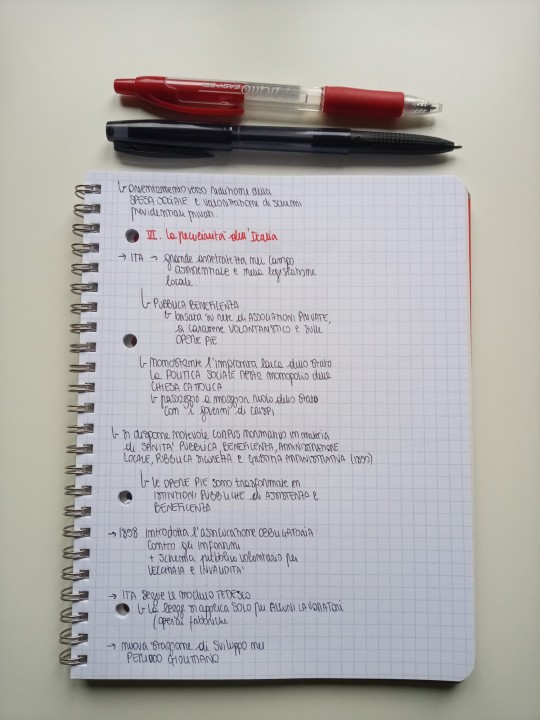
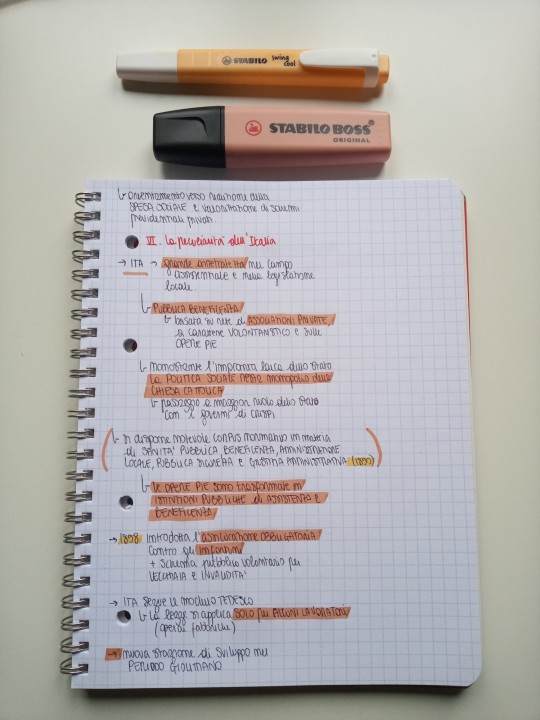
Example of symbols and structure of the notes and the way I highlight things (in which you'll hopefully be able to understand my handwriting, and in which there might be some spelling errors but alas that often happens in my real notes as well so if there are any it's for the sake of accuracy lmao). If I end up adding informations on the margins I always use a pen of a different color so I can tell which informations I got from what source (ex. main notes from lecture, colorful notes from additional article).
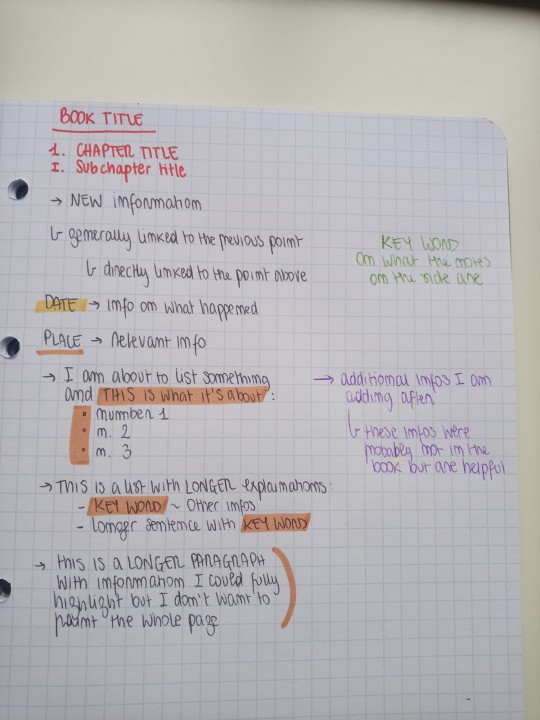
Example of messier notes in which the main text in black are the notes I took during lectures and the additional colorful text was added while writing the materials (I rarely do this, it usually happens when the lectures follow a book precisely, which happens when we have to study books or summaries written by the professor). As you can see I often use post it notes to add more writing space, and sometime I even use them to create visually separated sections. If I end up adding some drawings I also usually like to have them on post it notes so they stand out more (and if you are wondering why the hell would an history student need drawings it's usually either because I need a map or a region/state to mark things out, or when studying for archaeology exams I often needed visual references, for example to identify different types of vases or decorations).
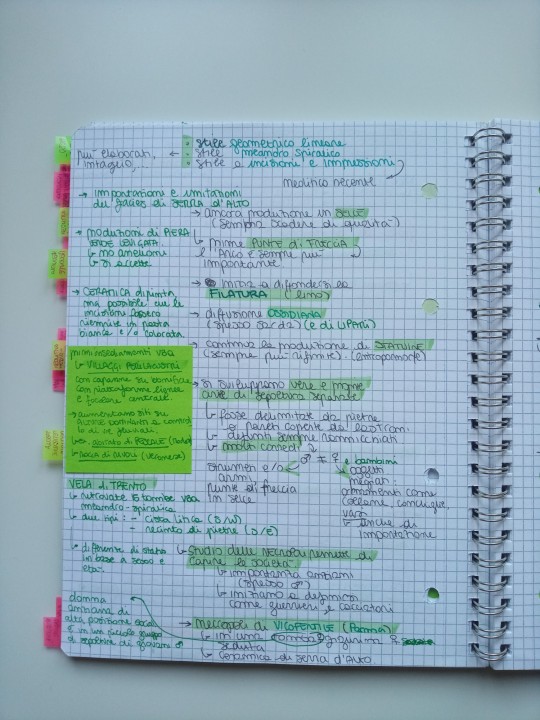
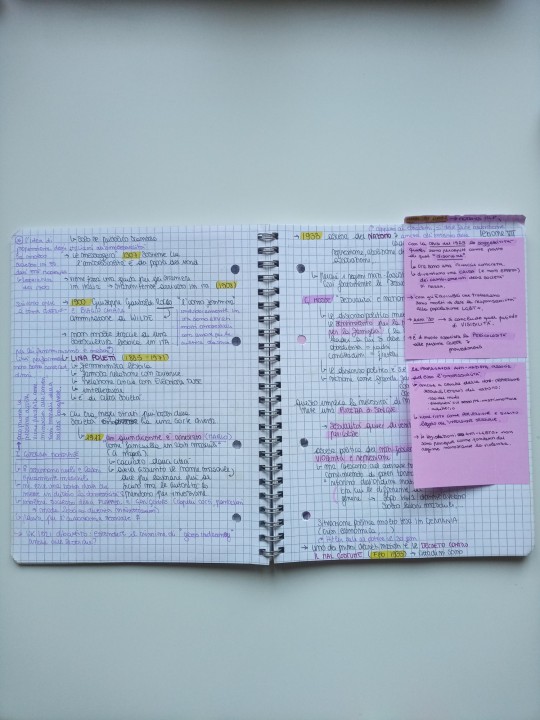
#this should be it#i was hoping on a more structured post but it was harder than i expected to write#both because so much of note writing is now a brainless activity for me and also bc it's really not easy to exaplain certain aspects#like the symbols i use#i really did my best and hope it will be useful#then again if y'all have questions the inbox is open and i will try my best to answer whatever your heart desires#studyblr#studyinspo#studying#study tips#study advice#note taking#hadwritten notes#my note taking method#how to take notes#non fiction books#academia#uniblr#university#booklr#study method#mine#the---hermit
237 notes
·
View notes
Text
We ask your questions so you don’t have to! Submit your questions to have them posted anonymously as polls.
#polls#incognito polls#anonymous#tumblr polls#tumblr users#questions#studyblr#student life#school#high school#students#university#homework#college#middle school#polls about school#submitted oct 26
612 notes
·
View notes
Text


3.5h hours of studying math
Spent 2.5 hours finishing my notes on storastic theory - managed to not only understand three topics we haven’t covered yet but also come up with a question for my teacher! I’ll ask her about it on Monday (if I don’t forget…). For hour 3 I had to decide between linear algebra and calculus. I chose the latter and regret it because I understand *nothing*. To be fair, it’s been 1.5 years since my last calculus class…
#finn is studying#high school#high school students#high school studyblr#studyblr#high school senior#studying#studyspo#study aesthetic#do your homework#i have homework to do#studying inspiration#study blog#study motivation#study inspiration#study notes#studying inspo#math class#mathblr#mathematics#math#linear algebra#calculus#final exams#exam preparation#exampreparation#math questions#digital notes#goodnotes#math notes
64 notes
·
View notes
Text


3 December 2024
Current read recommended by a friend and today's instrumental analysis lab: conductometric titration :)
#the test wasn't hard except for one of the 4 questions#we'll see how strict the prof is over grading ig#mine#op#studyblr#chemblr#studyspo#study motivation#chemistry#stemblr#study
69 notes
·
View notes
Text
Life Update...
I just paid my tuition, so it seems like it's time to let the cat out of the bag. So long as my visa isn't randomly rejected, I'll be moving to Japan in spring of next year! I'll be there for one year at the very least, the plan is to be there for three to four years, but depending on how it goes and how everything pans out, I won't deny the possibility of moving there permanently.
My first plan of action is attending a language school, basically until I pass the N2. Right now I'd put myself at about halfway there, so my hope is to only spend one year in the language school. After that, and this is a big reason for my moving to Japan, I'll apply to a trade school for instrument repair. For those who don't know, I have a degree in music performance. While in university, I met someone who ended up moving back to Japan to get certified in instrument repair, and that's the school I'll be applying to! Instrument repair is an incredibly hard industry to break into in the United States, where I'm from and live right now, because there aren't any schools that offer courses in it.
Without saying exactly where I'll be, I am going to be in the Kansai region. I wasn't initially sure if I wanted to be outside of Tokyo for my first time living in Japan, but when I reached out to GoGoNihon and they recommended a Kansai school, it felt like fate. Kansai-ben is my favorite dialect of Japanese and it's been a far off pie-in-the-sky dream of mine to speak it effortlessly ever since I started learning Japanese.
Needless to say, I am excessively excited about this new journey in my life. And with that, please (please!) tell me your favorite spots in Japan, whether they're underrated hidden gems or tourist traps that everyone and their dog has been to. I want to know! Location and prefecture doesn't matter- with how long I'll be in the country, I'd like to take the opportunity to travel as much of it as I can. It also doesn't matter what it is. Tell me about your favorite roadside shrine, a great restaurant you went to, or your favorite specialty store. I also don't have an expiration date on this. If you want to tell me about somewhere in the next ten minutes, that's great, but I would also love to hear about it three weeks or even three months from now.
TLDR; I'm moving to Japan!
#langblr#studyblr#benkyou posting#polyglot#language learning#japan#japanese#japanese langblr#日本語#also feel free to ask me any questions that you have about any part of the process#ill be moving at the end of march though#hopefully i can catch some sakura#no proofreading we post like students
54 notes
·
View notes
Text
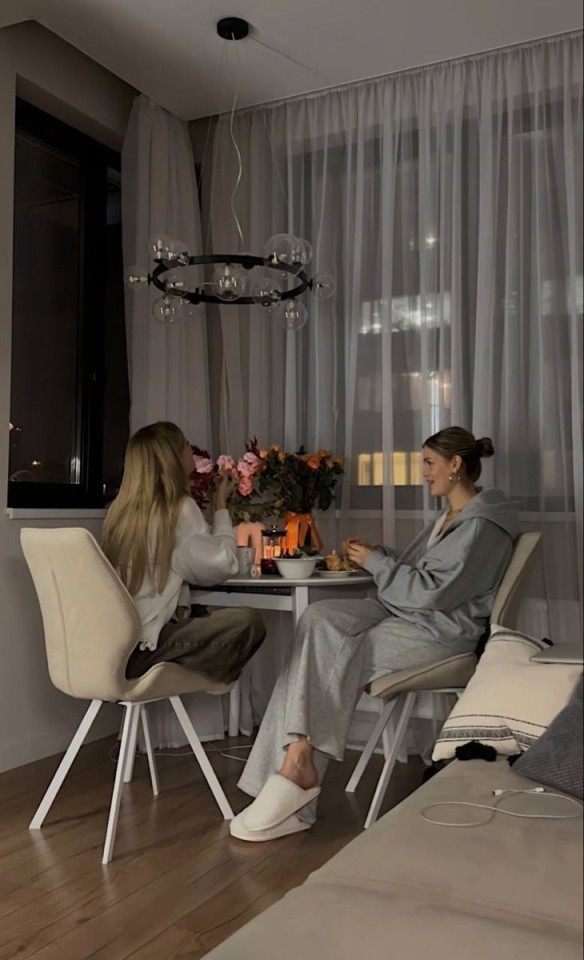
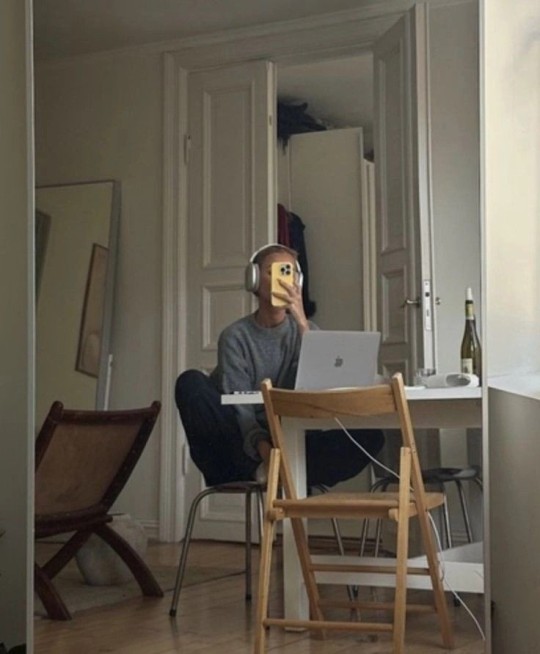
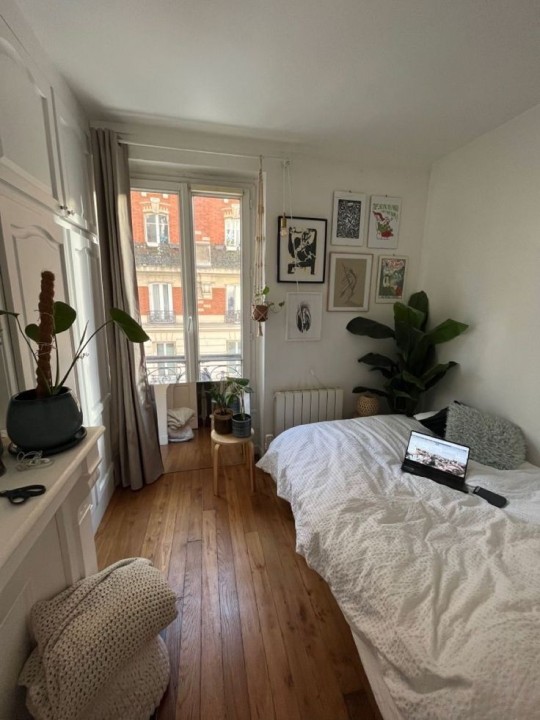
❥﹒♡﹒☕﹒ 𝘄𝗵𝗮𝘁 𝘁𝗼 𝗲𝘅𝗽𝗲𝗰𝘁 𝗳𝗿𝗼𝗺 𝗲𝗿𝗮𝘀𝗺𝘂𝘀 pros and cons
a girl asked me to talk about my erasmus experience in the questions box and she inspired me to make this post. if you have posts to request don't be shy! unfortunately i don't have all the time i would like to uptade but i will try to keep up.
erasmus is a student mobility program of the european union that allows a european student to attend a school in another EU country for a period of time legally recognized by their home institution.
it is a temporary experience with many benefits, enabling students to engage with different cultures and customs. due to its non-permanent nature, i believe it is one of the most beautiful opportunities for a student to feel completely free to explore and understand themselves, to figure out what they want and do not want from their life and educational path.
but let’s start by discussing its downsides. unfortunately, not everything is perfect.
𝟭. paperwork ( 📄 )
hey, i know, guys, i'm not the first or the only one to say this, but the paperwork for erasmus is a pain in the ass. it's not only extremely complicated, but universities (mine for sure, but i know it's a common experience) provide zero help in filling out the documentation. especially if you're not familiar with bureaucracy (and at 20 it’s normal not to be familiar with these things), it can seem like an insurmountable mountain. but if i, someone who doesn’t understand anything about this stuff, managed to get through it, you can do it too. typically, the documentation includes:
various information like ID, health card, and the IBAN of an account in your name (or joint name) where they will deposit the scholarship.
learning agreement, another plague sent from hell because you usually have to deal with two professors, one from your university and one from the host university, who clearly would prefer to mop the sea than help you fill out your learning agreement.
financial agreement for the scholarship, which has specific deadlines by which you need to submit documents (usually IBAN, learning agreement, and acceptance letter from the host university). fun fact: i almost missed this and didn’t receive the scholarship because these deadlines were buried deep in my university’s website (don’t be like me, make sure to be informed well about the financial agreement or you risk being left without money).
the best advice i can give you is to find someone from your university who has already done the erasmus where you’re supposed to go and ask them for some information. they, having gone through it, know what mistakes to avoid and what’s best to do. the offices often assume too many things and give you insufficient and hasty information.
𝟮. finding an accomodation ( 🏡 )
this too, another pain in the ass. it depends on the city, but here in madrid, finding a place to live has been a nightmare (and indeed, i've significantly overshot the budget i had set for rent). you have various options for accommodation:
student dormitories these solutions may seem the best at first glance, but they aren’t always. here in madrid, the fees for the dormitories at my campus cost more than my current rent, plus having only one kitchen for an entire floor is not exactly optimal comfort, especially if, like me, you cook a lot.
apartment studio/flat this is definitely the most comfortable option, but also the most expensive. a studio outside the center in big cities can cost up to €1000 a month. however, if you can afford it and prefer privacy, then go for it. at first, living alone might not be easy, especially if it’s your first time away from family, but you’ll get through it quickly.
room in an apartment this can be the best or the worst option depending on your luck because having flatmates means cohabitation, which is not always pleasant. if you're going in erasmus with someone you know, it might be optimal to share an apartment or take two rooms in a larger flat. personally, i rented a room in an apartment with three other people (two bathrooms and a kitchen), and i couldn’t be happier; i love my flatmates, and we quickly became friends. we cook together, go out together, spend entire evenings chatting and joking and they helped me a lot overcoming the first crisis. i realize, though, that i am an exception, so choose your accommodation carefully.
in short, consider your choice based on 3 factors:
proximity to the university/public transport links i study outside of madrid, almost an hour by bus from my place, but i live practically across from the bus stop, so it’s not a problem at all.
centrality/connection to the city center you're in erasmus to experience the city!
comfort of the place such as private bathroom (very hard to find but not impossible), utensils, AC, appliances (we have a dishwasher at home, and i assure you it saves our lives everytime).
𝟯. homesickness ( 🤧 )
yes, everyone feels homesick, even the most stoic. but guarantee you, you'll get through it. first of all erasmus, fortunately or unfortunately, isn’t forever. it’s a 6 month/1 year experience that is incredibly valuable for your personal growth, at the end of this period of time, you'll be back home. secondly, you can always stay in touch with friends and family in the age of technology. those who truly love you will support you in this project and do everything they can to make you feel less lonely. lastly, during erasmus, you’ll make many amazing friendships and connections that you otherwise would never have the chance to make.
𝟰. language barrier ( 🦜 )
i can’t say much about this, i've never studied spanish in my life, but, since i'm italian, i have no trouble following the lessons and understanding people when they speak, even though i'm still not able to express myself well in this new language. however, by living in another country, you’ll learn the language much faster and more effectively than with any academic course. in just a month, i already feel much more comfortable with spanish, and everyday i learn new things.
and of course, i could talk for hours about the benefits of erasmus, but i might save my praises for a post i'll write later, towards the end of this experience.
i can tell you that in just a month here, a whole new world has opened up for me. not only is the thrill of being in another city, in another country, an electrifying flow of continuous energy, but i’ve also realized things about myself that i might have ignored before.
i have much more confidence in myself; i feel freer, less afraid of making mistakes. it’s true, i’m far from my family and friends, but this also means i’m far from all those eyes under which i always try to appear perfect.
i crave to see and learn, i'm eager to discover new things, and this drives me to do things i probably wouldn’t do in my home country, to appreciate their flavor and indulge in the uncertainty of "maybe i’ll like this".
for the first time, i’m experiencing a new country without the rose-tinted filter of a short vacation. i’ve never felt as rich and full of gratitude as i do now, and i hope this is a feeling every student can experience.
so, erasmus, yes or no? absolutely yes.
i’d love to keep updating you on my experience abroad. what do you think? would you like that? let me know in the comments! star kisses ⭐
#stressed erasmus student#erasmus#erasmus life#study abroad#exchange student#college#education#school#academia#student#study aesthetic#study blog#study inspiration#study motivation#note taking#erasmus questions#college student#student life#studying#study community#study notes#architecture studyblr#studyblr#studyblr community#study tips#studyinspo#studyspo#uni student#university life#uni life
89 notes
·
View notes
Text
i was gonna make a post about how i love annoying my professors with really dumb questions last night
but this morning i received an email the size of an essay with an attached scientific report and constant compliments on such a good question that my prof is gonna use it as a limitation for a study he's doing

#study blog#studyblr#study motivation#studying#my post#academic#student life#uniblr#ASK STUPID QUESTIONS GUYS#ITS PROBABLY NOT STUPID#i've been obessing over this for 15 minutes#My stupid questions are not stupid#i love uni#i love asking questions#hashtag curiosity#hashtag blessed
25 notes
·
View notes
Text

I've been training my whole life for this
#japanese#langblr#anime#all according to keikaku#studyblr#language#kanji#keikaku means plan#also the review question wasn't just that haha#it asks you for the kana first#and then the translation#or you get the translation or the kana#and then you have to write it
118 notes
·
View notes
Text
Writing Dialogue: Questions (pt. 3)
Wh-questions
Begin with what, when, where, who, whom, which, whose, why and how.
We use them to ask for information.
The answer cannot be yes or no:
A: When do you finish college? B: Next year.
A: Who is your favourite author? B: Sylvia Plath.
Yes-no Questions
These are questions that need either a yes or a no answer.
Examples:
Do you like vanilla ice cream?
Have you ever seen a ghost?
Short Questions
In informal situations, especially in speaking, we can reduce questions rather than using complete clauses.
Short questions can be clauses, phrases or even single words:
Full form: Are you hungry? Short form: You hungry? or Hungry?
Follow-up Questions
Spoken English: In conversation, we often ask short questions about something that somebody else has just said.
There are a number of types:
Reduced wh-questions
Spoken English: We often reduce wh-questions in conversation because the speaker and the listener know the context.
In the following examples, the short form of the question is more correct, because the full form would sound artificial:
A: I need to go to the shop. B: What for? (full form: What are you going to the shop for?) A: We need bread and milk.
A: I’m going out tonight. B: Who with? (full form: Who are you going out with?) A: Oh, just some friends.
Follow-up questions to show interest or surprise
Spoken English: We often use follow-up questions when we are listening, to show that we are interested or surprised.
They often do not need a response.
They are like response tokens such as really, okay, yeah.
Follow-up questions are sometimes called reply questions.
Follow-up questions are formed using the auxiliary verb or modal verb contained in the statement that the question is responding to.
If there is no auxiliary verb or modal verb in the statement, we use do in the present and did in the past:
A: I left school when I was 14. B: Did you? Really? A: It was in the 1950s. Many kids left school early then.
A: Carla’s decided to move to Spain. B: Has she? Good for her.
A: I can’t watch horror movies. B: Can’t you? A: I just can’t. They frighten me too much.
Echo & Checking Questions
Spoken English: We use echo questions to repeat part of what we have just heard when we don’t fully understand or when we want to confirm what we have heard.
We use rising or fall-rising intonation:
A: Did you hear Pete’s giving up his job. B: Pete’s giving up his job?
Echo questions are often statements (declaratives) with a wh-word at the end:
A: His name is Thokosani. B: His name is what?
In speaking, we sometimes ask questions of ourselves as we speak.
We do this when we are trying to remember specific information or to show that we are not sure or when we want our listener to confirm something:
[trying to remember/showing uncertainty]:
"There’s a great new restaurant on that street, what was it called, Marco’s, I think."
[looking for confirmation]:
A: Fiona is coming to stay in June, when is it, the last weekend in June? B: Yeah, I think that’s right.
pt. 1 pt. 2
#writing notes#questions#langblr#linguistics#studyblr#writeblr#writers on tumblr#literature#poetry#spilled ink#dark academia#poets on tumblr#writing prompt#creative writing#dialogue#character development#writing refresher#writing reference#writing resources
106 notes
·
View notes
Text

Fighting inner demons (midterms) rn
Anywhoo… as im shaking from being over caffeinated, i figured it would be a good time to ask if anyone has any productivity/academia related questions for this old humble third year neural science student here. You can comment them to this post or dm me so that i can answer anonymously. As long as its nothing too private, ill try to answer them all! Im at no place to give good advice imo but i have some experience at this point i suppose…
Best of luck fellas, im cheering for you :)
#studyblr#study motivation#studyspo#chaotic studyblr#study aesthetic#study blog#studyinspo#chaotic academia#productivity boost#study#studyspiration#study inspiration#qna#questions#stem student#student mental health#student life#academia#stem academia#life advice#advice#stem aesthetic#stem studyblr#university#undergraduate#academic pressure#mental health
20 notes
·
View notes
Text
My Study Method
I have quickly mentioned my study method in several posts through the years but I don't think I have ever written a proper post about it, so here it is.
I have to say that overall my study method is quite time consuming, but in years of experience it's what works best for the type of learner I am, the materials I have to study and the type of exams I have. I believe these three elements are the fundamental things you should figure out when creating your own study method. Let's go over these things quickly. Firstly I am an history student, tho not all my exams are history based (I have taken some language, philosophy, anthropology and litterature classes) so my method is proofed for most humanities. I am a learner with terrible memory, if you give me a list of things to learn by heart expect me to fail because my brain simply cannot do that. So I have to train myself to learn things when studying for an exam. As for the type of matherials I have to work with when studying for an exam, they are mostly full non fiction books, sometimes I have to work on articles as well, and depending on the class I have lectures to attend.
The fundamental element of my study method are the notes I write. That's why in my daily posts I am constatly mentioning them. The lectures I attend are turned into notes, the books and articles I have to read are turned into notes, everything you leave me with for too long will be turned into notes. The very act of writing is what truly helps me get into the topic, understand it, and memorize it. I might write an indepth post on how I write notes in the future, but for now what you must know is that the goal of my notes is to be the only material I actually study in the end. As I mentioned the very act of writing is itself a huge part of my study process. When I am listening to a lecture I try to write down notes as tidy as possible, and then try to fix them at home if needed. So there's not much to say there, as for the materials I have to read here's how I do it. When I get a book I have to study I usually read a chapter and underline all the important bits that I will be transferring to my notes as I am reading. When I am done with the chapter and have the topic still fresh in mind I write down by hand all my notes. The goal is to write everything I need to know, in a direct and easy way using my own words. By re-elaborating the original text I am making sure I am not blindly copying things, and actually understanding stuff. Once the entire book has gone through this process, the book goes back on the shelf and as I said I only work on my notes from then one.
Once I have all my notes ready a long time has probably passed, but in reading and writing I have already started to memorize things in general. I try to highlight my notes as I am writing, but in case I don't I go back once I am done writing, doing a quick reread and highlighting important stuff. I usually use two different colours: yellow for the important dates and another colour for the other informations. At this point there's two more steps left. Repeating and writing key words.
If writing notes can be counted as half of my studying, repeating outloud is the second half. Since I have oral exams I have to make sure I am comfortable with exaplaining things, showing I have understood things and I am not just midlessly reciting a list, and using the right terms. I am a very lucky person because my dad is both retired and quite interested in the topics that I study, which means that I get a lot of help from him in this phase of studying, because basically what I do is following him around the house for a few days exaplaining my notes to him. If you do not have someone to annoy with your study, talking to yourself works too but you have to speak outloud and honestly pretend you are giving a lecture. If you just go over your notes and read them it is not the same thing, it's way less effective. I usually do two rounds of repeating. The first one looks a lot more like reading and saying things outloud in my own words. By the second one I am usually much more comfortable with informations so I have my notes there only to guide me through topics making sure I don't miss anything. Having someone who actively listents to you is definitely a bonus because if they ask you questions they challenge you in the exact same way an oral exam does, and you make sure your exaplainations are as clear as possible.
The very last step is going through my notes one last time with the goal of writing a long list of key words. This is a tool I specifically use to review things quickly the day of the exam. Usually during my commute I reread the list of words in my head and I mentally make sure I remember about everything.
As mentioned this is a longer study method but it truly locks things in your brain, and paying that much attention to note writing also makes them a tool that lasts in time. If I am interested in the informations of any of the books I read during my degree I can pick the notebook in which I wrote those notes and find the information right away without even having to open the actual book. I usually dedicate a whole notebook to each book, in order to archive and find them easily. I will be writing a specific post on the way I write notes, maybe including a few pictures, but in the meantime I hope this was somewhat helpful.
#kids i have written this the other day and rereading once so there is surely typos and not perfect sentences but i think it does the job#i am thinking of making one more post on how i write my notes since they are so important to me and then maybe writing a post on oral exams#do let me know if something isn't clear or it you have questions!#when i was still working on creating a stuy method i found posts like these quite useful so hopefully this will be helpful for someone#studyblr#studyinspo#study tips#study method#uniblr#university#historyblr#studying#student life#study motivation#study blog#study advice#mine#the---hermit
144 notes
·
View notes
Text
everybody’s telling how neet2025 had the toughest physics questions ever and as someone who will be writing the exam next year meri gand phat rhi h guys
19 notes
·
View notes
Text

You gave all that sweat and blood, now you think you're gonna drown
Somehow I am starting to like math. I don’t know why but I won’t complain either haha :) Math class was cancelled again so I completed the materials at home + managed to come up with a question to ask next lesson. I got my history exam back (80%) and received an A* for my oral mark, I’m really really proud of that!! That pride was overshadowed by the English lesson I had just before history though. Our current topic is „gender“ and the lesson was spent by my teacher presenting a badly researched, transphobic presentation. He went through the slides beforehand (they were created by one of his students a few years ago) and realised they weren’t correct, but nevertheless decided to use them…thanks for ruining my mood at 8 in the morning.
Finally got ~7h of sleep; physically I’m feeling okay, mentally rather not. School isn’t treating me too well atm.
#finn is studying#high school#high school students#high school studyblr#studyblr#high school senior#studying#studyspo#study aesthetic#do your homework#i have homework to do#studying inspiration#study notes#study blog#study motivation#study inspiration#honest studyblr#math homework#math class#mathblr#mathematics#math#dark academia#academia aesthetic#exam preparation#exams#good grades#studying inspo#ap english#math questions
42 notes
·
View notes
Text
HANNIBAL MNEMONIC for Functional Group Order of Precedence For Organic Nomenclature
Just to spice up organic chem and help with nomenclature here's a hannibal mnemonic i made a few months back that helps me remeber the order quite well:
Chesapeake ripper and his Sweet daughter Abigail Eat Humans And Normies And Kill The Adults That Annoy Easily.
(this is in increasing order of priority)
Chesapeake- Carboxylic acid Sweet- Sulphonic Acid Abigail- Anhydride Eat- Ester Humans- Halide (Acid Halide or R-CO-X) And- Amide Normies- Nitriles (-CN or in inorganic it is called cynide) And- Aldehyde Kill- Ketone The- Thiones Adults- Alcohol That- Thiols Annoy- Amines Easily- Ethers

#chemistry#stem student#women in stem#hannibal#hannibal nbc#nbc hannibal#murder husbands#hannibal lecter#abigail hobbs#studying#study motivation#studyblr#study blog#student#questionable methods of studying#but you will get the grades#academic tricks#stemblr#stem academia#science#stem aesthetic#organic chemistry
29 notes
·
View notes
Text
StudyLapse
⬆️ Chemistry mind map to revise
Today has been interesting
Signing off~
StingrayStudies
#study blog#study aesthetic#studyblr#studyinspo#studyspo#student#study motivation#study#studylapse#studying#questioning life choices rn
62 notes
·
View notes